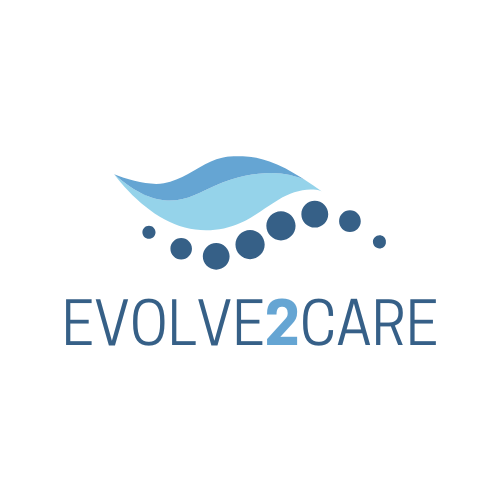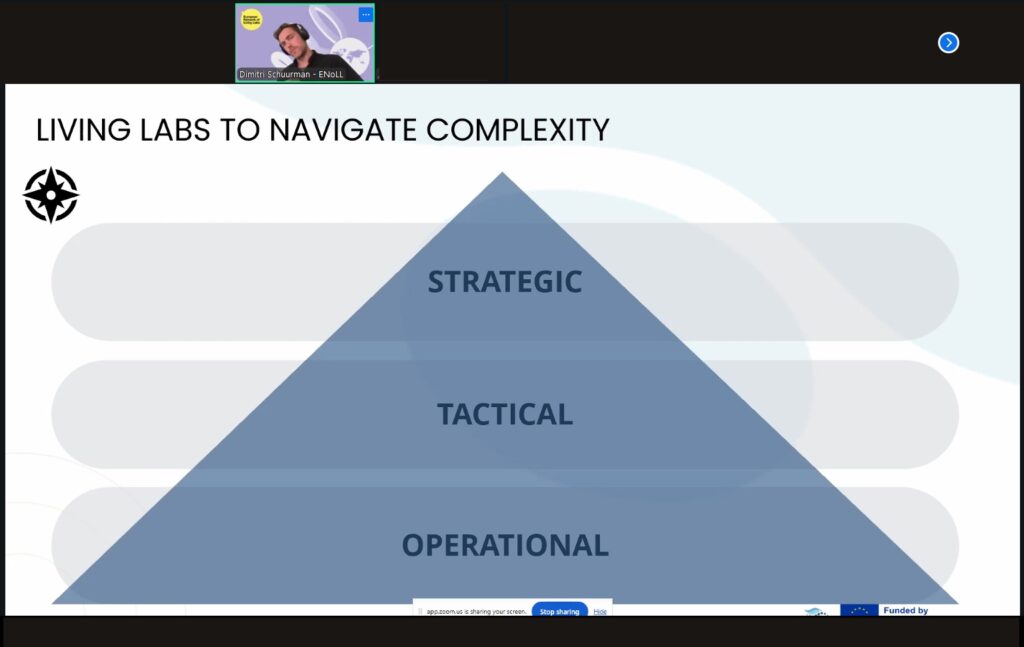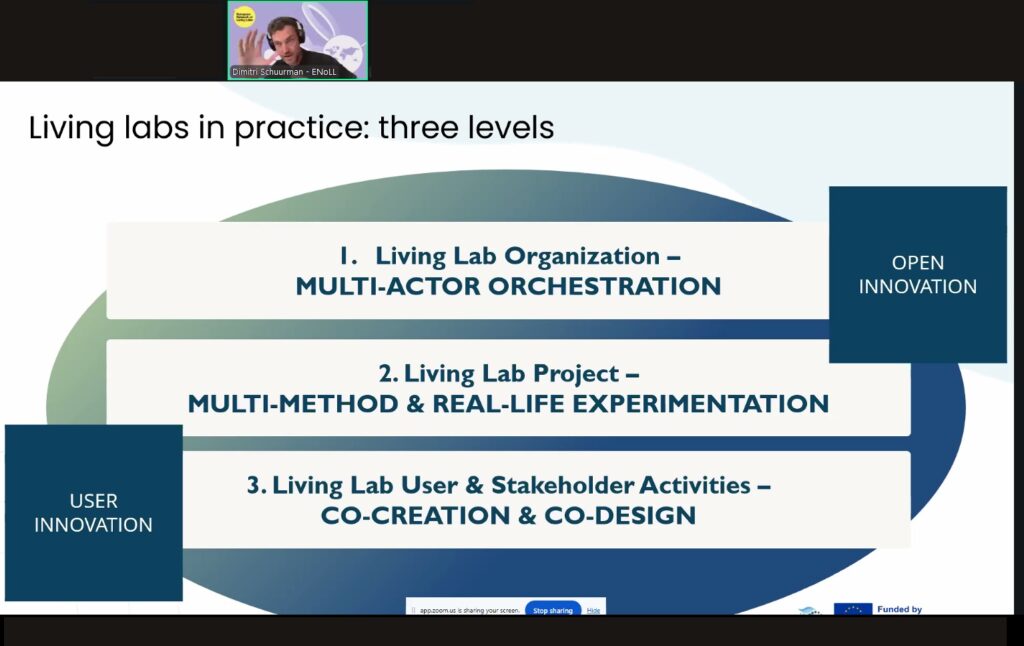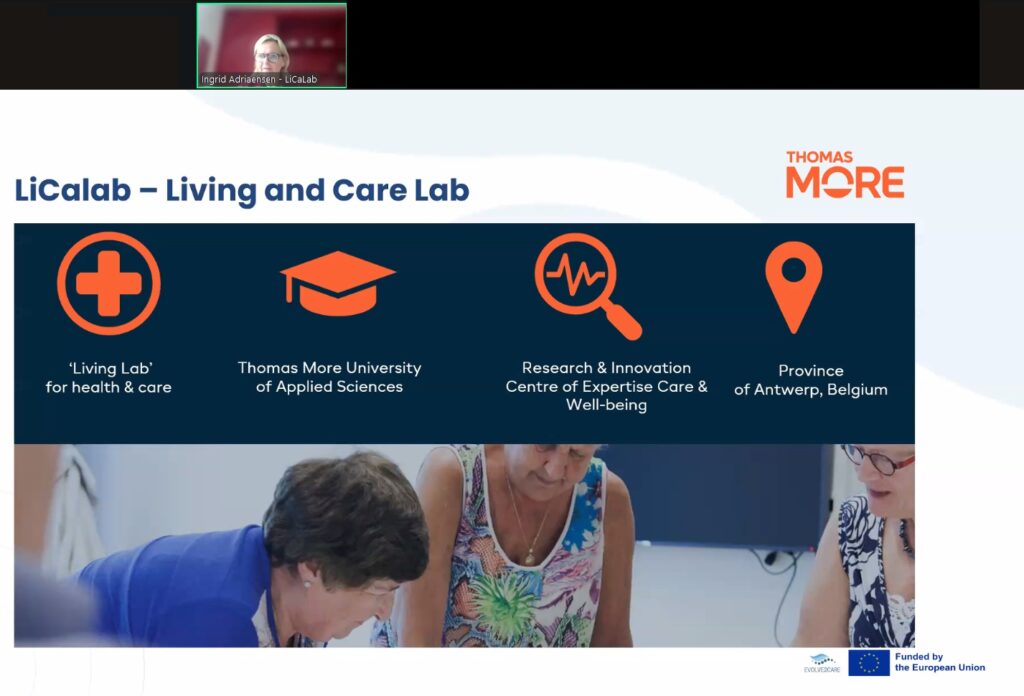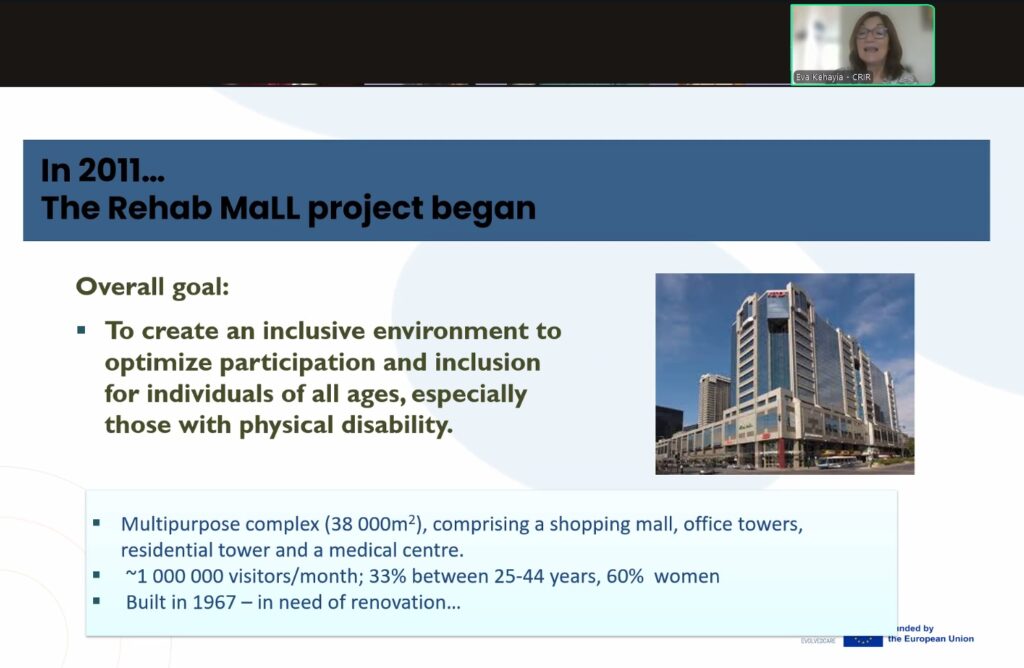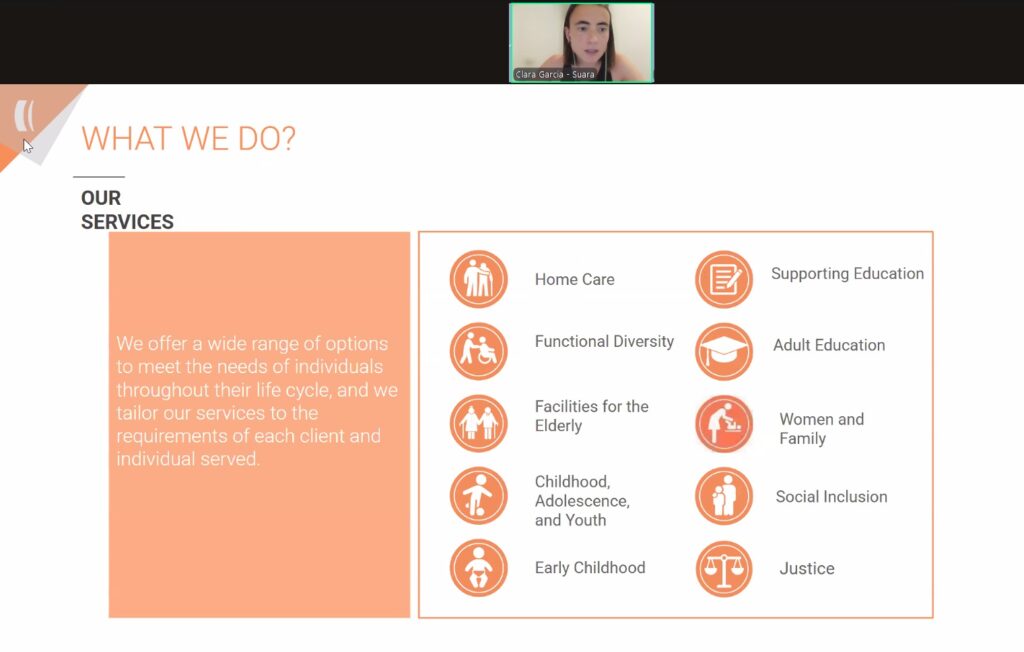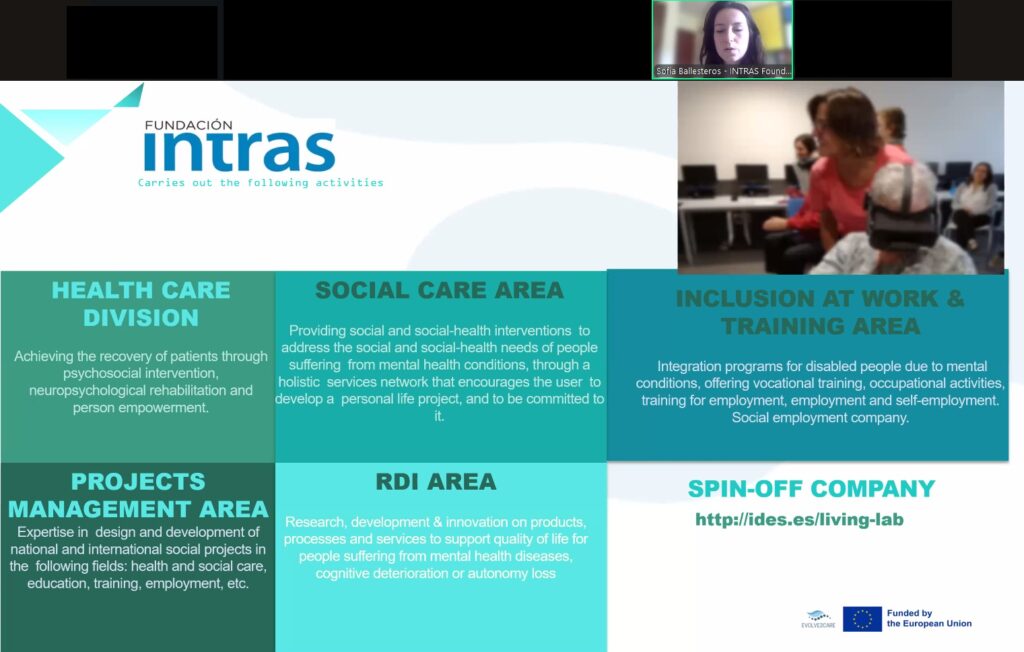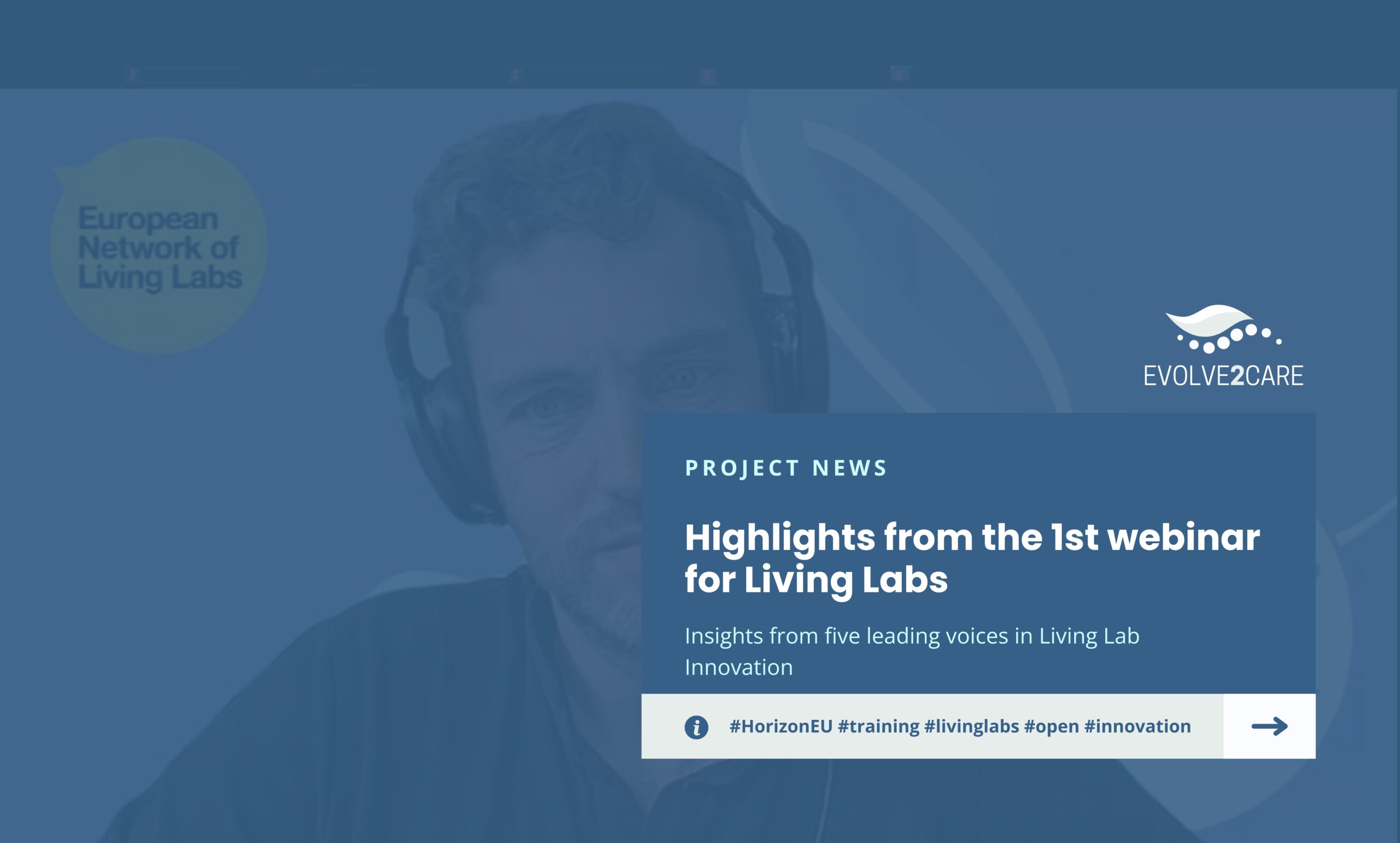
The first session of “Trainings on Service Design for Living Labs”, held on June 25, 2025, successfully brought together 23 participants for an engaging and insightful webinar titled “The Role of Living Labs in the Innovation Ecosystem.” The session featured five distinguished speakers—Prof. Dr. Dimitri Schuurman, Senior Research Strategist (ENoLL), Ingrid Adriaensen, Business Manager (LiCalab), Dr. Eva Kehayia (RehabMaLL), Clara G. García Blanch, Pilot Test Manager, (Suara), and Sofía Ballesteros Rodríguez, Social Worker (Fundación INTRAS)—and was facilitated by Marta I. De Los Rios White and Francesca Sperandio from ENoLL.
The discussion began with Prof. Schuurman, who situated Living Labs within broader innovation frameworks, tracing their evolution from the Triple Helix model (government, academia, industry) to the more inclusive Quadruple Helix, which incorporates civil society. He emphasized the strategic role of Living Labs in open innovation, particularly their contributions to value creation, co-creation, and real-life experimentation. He also introduced a framework for navigating complexity across strategic, tactical, and operational levels.
Building on this, he described the importance of anchoring Living Labs in a clear mission and vision—one that addresses long-term partnerships, user needs, and value creation—through an ecosystem-driven approach. Finally, he illustrated how Living Labs function in practice across three layers: multi-actor orchestration at the organizational level, multi-method and real-life experimentation at the project level, and active stakeholder engagement through co-creation and co-design at the activity level—underscoring their dual role in fostering open innovation and empowering user innovation.
Following this, each speaker presented a unique Living Lab case, offering practical insights into how these collaborative environments are driving user-centered innovation across diverse sectors.
Ingrid Adriaensen – LiCalab
Ingrid Adriaensen presented the Living and Care Lab (LiCalab) based in the Province of Antwerp, Belgium, embedded within Thomas More University of Applied Sciences. She explained how LiCalab supports companies in developing and validating care-related innovations by offering a strong user research infrastructure, including a panel of over 1,200 citizens and care professionals, and by leveraging collaborations with hospitals, municipalities, and international networks.
LiCalab focuses on care technology—including e-health, medtech, assistive and communication tools—and innovative models for collaboration in care settings, with a strong emphasis on sustainability, inclusion, and both digital and health literacy. A key example was the ‘Welgerust’ (Well Rested) project, a multi-actor initiative tackling sleep issues through a blended care approach. The solution combines the Moonbird device—which uses biofeedback to guide users through optimal breathing patterns—and tailored psychological support. The project, which targets both adults and children, caregivers, and a local hospital, illustrates how Living Labs can drive user-centered innovation from early-stage development to real-world testing.
Dr. Eva Kehayia – RehabMaLL
Dr. Eva Kehayia (CRIR – Centre for Interdisciplinary Research in Rehabilitation of Greater Montreal) presented the Rehabilitation Living Lab (RehabMaLL), a pioneering initiative promoting full social participation and inclusion for people with disabilities. Situated in a public commercial mall in downtown Montreal, RehabMaLL offers a real-life environment where citizens, researchers, clinicians, policy makers, and community organizations come together to co-design and test socially inclusive innovations. Eva showcased the TeleRehab-GT platform, developed collaboratively with stroke survivors, caregivers, and health professionals to ensure that telerehabilitation tools align with users’ needs and values. The Living Lab fosters innovation through inclusive, interdisciplinary collaboration, combining real-world conditions with simulation spaces, and guided by the core principles of respect, equity, and user empowerment.
The RehabMaLL is a multi-tasking environment that enables users to engage in everyday activities (e.g., shopping, and social interaction) while testing assistive or rehabilitative technologies. This setup allows researchers to evaluate user experiences in dynamic, real-life contexts, increasing the relevance and applicability of innovation outcomes.
Clara G. García Blanch – Suara Social Digital Living Lab
Clara García Blanch presented the work of Suara’s Social Digital Living Lab, which promotes technological and service innovation within one of Spain’s largest social economy cooperatives. The Living Lab is grounded in four core values: a person-centered approach to care and innovation, digital inclusion as a means to reduce inequalities, co-creation with all stakeholders from the outset, and a strong commitment to continuous evaluation, learning, and adaptation.
She explained that Suara delivers a wide range of services tailored to individual needs across the life course—from early childhood to elderly care, including areas such as functional diversity, social inclusion, adult education, and justice.
A key focus of her presentation was the collaboration with Broomx, an immersive technology company. Through this partnership, Suara implements immersive and virtual reality experiences for mindfulness, cognitive stimulation, and recreational purposes in care settings. These interventions support core areas such as well-being, neurorehabilitation, and psychostimulation, particularly benefiting vulnerable or older populations.
Sofía Ballesteros Rodríguez – MINDLab
Sofía Ballesteros presented the work of Fundación INTRAS, a non-profit organisation dedicated to supporting people with mental health conditions, cognitive impairments, and other vulnerabilities. At the core of INTRAS’ innovation strategy is MINDLab, its certified Living Lab and a member of ENoLL. MINDLab acts as a permanent co-creation space supporting innovators through close collaboration with users and professionals. Its intervention scope centres on people with mental health challenges and cognitive decline, and its main competencies include:
- Cognitive intervention & rehabilitation through new technologies
- Sensory Stimulation
- Digital Health
- Empowering personalized interventions
- Co-design with users and public involvement
- Dissemination, knowledge transfer & research networking
- Digital learning, inclusion, and accessibility
- Connected Care at home and Independent living solutions
Also, she introduced VIVEMAIS, a cross-border and transdisciplinary initiative funded by the European Union, which aims to promote the design, adoption, and use of assistive technologies (ATs). These technologies are essential tools that enhance the functional capabilities of individuals facing challenges in communication, mobility, memory, and learning.
The session set a solid foundation for the series, sparking meaningful dialogue and offering actionable insights for Living Labs committed to advancing user-centered innovation.
What’s next?
The next session for Living Labs, “Designing Tailored Living Lab Services for Innovators,” will take place on July 9, 2025, at 15:00 CEST, and will introduce service design principles while exploring how Living Labs can create customized services to better support innovators and their specific needs.
